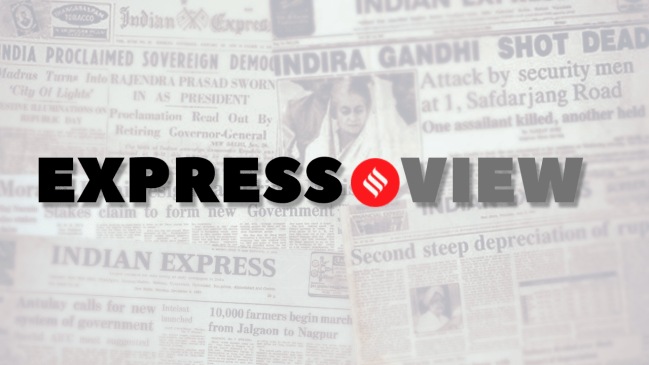Opinion Express View on Arvind Kejriwal’s speech: Maidan battlecry
He attempts to connect dots between his government's woes and Opposition concerns. It's a tall order
 Ever since its origins in the anti-corruption movement at the same Ramlila grounds, the AAP has worn its anti-politics on its sleeve.
Ever since its origins in the anti-corruption movement at the same Ramlila grounds, the AAP has worn its anti-politics on its sleeve. On the face of it, the Aam Aadmi Party’s rally at Ramlila Maidan on Sunday was yet another battle cry in the prolonged face-off between the BJP-led Centre and AAP’s government in Delhi. The two parties have been at loggerheads since 2015 — the main reason is the Union government’s efforts to circumscribe the powers of Delhi’s elected government. This battle has been fought on various fronts — through street protests, by shrill spokespersons on prime time TV, and in the courts. With the Centre effectively over-ruling the Supreme Court decision granting control over “services” to the Delhi government through an ordinance last month, the AAP had little choice but to ratchet up its opposition to the Centre’s moves. Chief Minister Kejriwal’s Sunday speech was, however, about more than just his government being hemmed in.
“An ordinance like the one for Delhi is like the declaration of dictatorship. It will be brought in Maharashtra, Rajasthan, Punjab, Madhya Pradesh,” Kejriwal said. Linking the actions of the Centre in Delhi to its “authoritarian” and “dictatorial” tendencies in general, and to PM Modi’s “ahankaar” or arrogance in particular, Kejriwal tried to draw a line that folds in the Opposition’s common motifs and themes — undermining of the independence of institutions, attacks on federalism, constitution-under-siege: “The Supreme Court of India, the highest hall of justice in the land… said the elected government, the people’s will is supreme… [PM Modi] is the first PM… to not respect the court,” he said. By announcing that he was building up support in the Rajya Sabha against the ordinance, the Delhi CM is trying to make his government’s predicament in the capital a broader plank for Opposition unity. For now, that is a tall order.
Ever since its origins in the anti-corruption movement at the same Ramlila grounds, the AAP has worn its anti-politics on its sleeve. This has been reflected in the distance it has kept so far from joint mobilisations and platforms of the Opposition, and the exceptionalism it has wrapped itself in. It did not speak up when other parties accused the Centre of selectively deploying the ED and CBI to target their leaders — till its own ministers, Manish Sisodia and Satyendar Jain, were sent to jail. It did not raise the concern of centralisation of power, until the Centre’s high-handedness made the functioning of its own government look like an obstacle course. It broke ranks with several other non-BJP parties to welcome the abrogation of Article 370. As it now seeks to cast itself in the role of prime mover of Opposition unity ahead of 2024, it will need to show a humility and negotiating skill that has so far been missing from its political repertoire.





